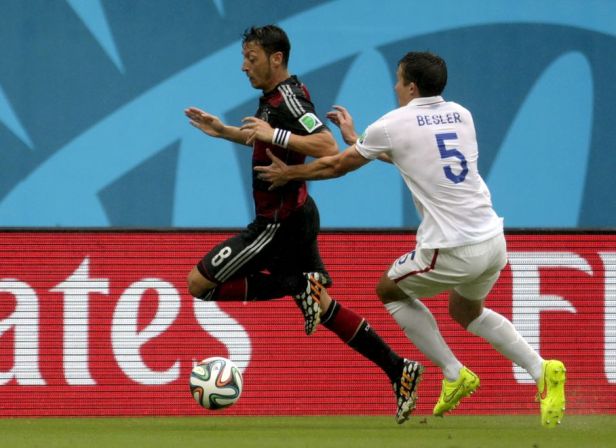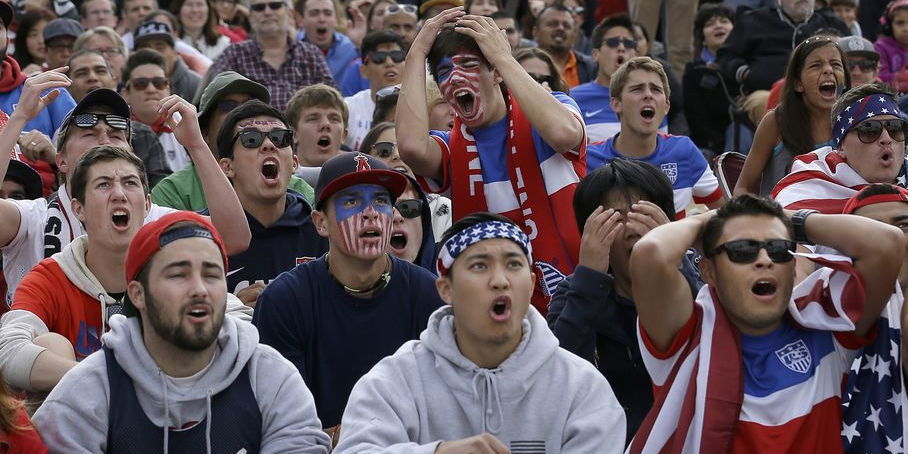RECIFE, Brazil — The United States reached the knockout stage of consecutive World Cups for the first time, just not the way the Americans wanted.
Videos by Rare
Germany beat the U.S. 1-0 Thursday in soggy Recife on Thomas Mueller’s 55th-minute goal to win Group G, but the Americans held onto second place when Portugal defeated Ghana 2-1 in a game played simultaneously in Brasilia.
The Germans, three-time World Cup champions, finished with seven points, while the U.S. had four after allowing a 95th-minute goal against Portugal on Sunday in a 2-2 draw. Portugal also had four, but the Americans advanced from the so-called “Group of Death” because their goal difference was even and the Portuguese were minus three.
The Americans will play the Group H winner, likely Belgium put possibly Algeria, Monday in Salvador.
The Americans sprinted out onto the field at the final whistle, about 30 seconds before the other game ended and made advancement official. Brad Davis raised both hands and led the applauding U.S. team to the side of the stadium where the majority of American supporters sat.
Just reaching Arena Pernambuco was an accomplishment. A tropical downpour flooded roads in a beach city known as the Brazilian Venice, and the U.S. bus had to make its way through ankle-to-thigh-high water that slowed traffic and left some cars stalled. Rain fell throughout much of the game, and there were scattered empty red seats.
The game marked meetings of several former international teammates facing each other, an unusual occurrence. American right back Fabian Johnson started for Germany in the 2009 European Under-21 Championship alongside three of Germany’s starters Thursday: Mats Hummels, Jerome Boateng and goalkeeper Manuel Neuer.
U.S. coach Jurgen Klinsmann starred for West Germany when it won the 1990 World Cup and coached his homeland to the 2006 World Cup semifinals. His top assistant that year was Joachim Loew, who succeeded him as Germany’s coach after the tournament. The two exchange a hug after the final whistle.
There had been fears before the match that the U.S. and Germany would not attack each other too much and be satisfied with a draw, which would advance both nations.
The Americans never came close to scoring until second-half injury time.
The script was similar to 2002, when the U.S. opened with a 3-2 win over Portugal, then tied South Korea 1-1 and lost to Poland 3-0. The Americans advanced 12 years ago because South Korea defeated the Portuguese on an 80th minute goal.
Copyright The Associated Press
It’s a time-honored American tradition for employees to scramble for excuses whenever work gets in the way of the big game.
These days, more and more companies want workers to watch it in the office rather than call in sick.
Thousands of eager Americans set work aside on Thursday — with or without their bosses’ OK — to watch the U.S. men’s soccer team play Germany in a key World Cup match.
Fans flocked to official watch parties in places like Chicago’s Grant Park, Washington’s Dupont Circle and Boston’s City Hall Plaza. Many more took part in supervisor-approved, morale-boosting breaks at the office.
The National Trust for Historic Preservation hosted a party for its staff of about 100 with a TV and food. In New York, Gov. Andrew Cuomo approved an extra hour of lunch for all state employees so they could watch the second half.
Matt Rogers of the Washington-based Urban Institute, which held a party for its 400 employees, said the World Cup is a great way to build office relationships.
“We don’t have many moments where you can find a common interest among a big chunk of that population. Sports, and in particular a World Cup-type event with a national team — and tense and dramatic sporting moments — really bring people together,” Rogers said.
U.S. coach Jurgen Klinsmann even posted an online note for people to give to their bosses. It asked managers to excuse staff to watch the game for the good of the nation.
“By the way, you should act like a good leader and take the day off as well. Go USA!” he wrote.
At the Department of Transportation in Washington, officials were concerned that so many employees would watch the match online from their desks that it would slow down the agency’s computer network.
“We are going to monitor bandwidth utilization throughout the day and we’ll plan to block the streaming sites should we encounter any network issues,” Todd Simpson, the department’s associate chief information officer, warned in an email to workers.
John Challenger, the CEO of executive coaching firm Challenger, Gray & Christmas Inc., estimated Thursday’s match could cost U.S. companies $390 million in lost wages.
But Challenger added that in an era of increasingly scattered workplaces, an investment in something that brings staffers together might not be such a bad idea.
“It’s what I would call a good buy for companies,” Challenger said. “It’s just like if you invite your team out to have drinks after work. You’re spending it on enhanced morale…and trust among your people.”
Copyright The Associated Press




